- Home
- Paulo Coelho
Brida: A Novel Page 3
Brida: A Novel Read online
Page 3
Wicca picked up the card and asked Brida to hold it. Brida did so, although without knowing quite what was required of her.
"In previous incarnations, your stronger side was always a woman," Wicca said.
"What do you mean by 'Soul Mate'?" Brida asked again. It was the first time she had challenged the woman, but it was, nonetheless, a very timid challenge.
Wicca remained silent for a moment. A suspicion crossed her mind--for some reason the Magus had not taught the girl about Soul Mates. "Nonsense," she said to herself and brushed the thought aside.
"The Soul Mate is the first thing people learn about when they want to follow the Tradition of the Moon," she said. "Only by understanding the Soul Mate can we understand how knowledge can be transmitted over time."
As Wicca continued her explanation, Brida remained silent, feeling anxious.
"We are eternal because we are all manifestations of God," Wicca said. "That is why we go through many lives and many deaths, emerging out of some unknown place and going toward another equally unknown place. You must get used to the fact that there are many things in magic which are not and never will be explained. God decided to do certain things in a certain way and why He did this is a secret known only to Him."
"The Dark Night of Faith," thought Brida. So it existed in the Tradition of the Moon as well.
"The fact is that this happens," Wicca went on. "And when people think of reincarnation, they always come up against a very difficult question: if, in the beginning, there were so few people on the face of Earth, and now there are so many, where did all those new souls come from?"
Brida held her breath. She had asked herself this question many times.
"The answer is simple," said Wicca, after pausing to savor the young woman's eager silence. "In certain reincarnations, we divide into two. Our souls divide as do crystals and stars, cells and plants.
"Our soul divides in two, and those new souls are in turn transformed into two and so, within a few generations, we are scattered over a large part of Earth."
"And does only one of those parts know who it is?" asked Brida. She had many questions to ask, but she wanted to ask them one at a time, and this seemed the most important.
"We form part of what the alchemists call the Anima mundi, the Soul of the World," said Wicca, without replying to the question. "The truth is that if the Anima mundi were merely to keep dividing, it would keep growing, but it would also become gradually weaker. That is why, as well as dividing into two, we also find ourselves. And that process of finding ourselves is called Love. Because when a soul divides, it always divides into a male part and a female part.
"That's how the Book of Genesis explains it: the soul of Adam was split in two, and Eve was born out of him."
Wicca stopped suddenly and sat looking at the cards scattered on the table.
"There are many cards," she said, "but they're all part of the same deck. In order to understand their message, we need them all, all are equally important. So it is with souls. Human beings are all interlinked, like the cards in this deck.
"In each life, we feel a mysterious obligation to find at least one of those Soul Mates. The Greater Love that separated them feels pleased with the Love that brings them together again."
"But how will I know who my Soul Mate is?" Brida felt that this was one of the most important questions she had ever asked in her life.
Wicca laughed. She had already asked herself that question and with the same eager anxiety as the young woman opposite her. You could tell your Soul Mate by the light in their eyes, and since time began, that has been how people have recognized their true love. The Tradition of the Moon used a different process: a kind of vision that showed a point of light above the left shoulder of your Soul Mate. But she wouldn't tell the girl that just yet; she might one day learn to see that point of light, or she might not. She would get her answer soon enough.
"By taking risks," she said to Brida. "By risking failure, disappointment, disillusion, but never ceasing in your search for Love. As long as you keep looking, you will triumph in the end."
Brida remembered the Magus saying something similar when he spoke about the path of magic. "Perhaps it's all the same thing," she thought.
Wicca started picking up the cards from the table, and Brida sensed that her time was nearly up. Yet there was one other question to ask.
"Is it possible to meet more than one Soul Mate in each life?"
"Yes," thought Wicca with a certain bitterness. And when that happens, the heart is divided, and the result is pain and suffering. Yes, we can meet three or four Soul Mates, because we are many and we are scattered. The young woman was asking the right questions, but she had to avoid answering them.
"The essence of Creation is one and one alone," she said. "And that essence is called Love. Love is the force that brings us back together, in order to condense the experience dispersed in many lives and many parts of the world.
"We are responsible for the whole Earth because we do not know where they might be. Those Soul Mates we were from the beginning of time. If they are well, then we, too, will be happy. If they are not well, we will suffer, however unconsciously, a portion of their pain. Above all, though, we are responsible for reencountering, at least once in every incarnation, the Soul Mate who is sure to cross our path. Even if it is only for a matter of moments, because those moments bring with them a Love so intense that it justifies the rest of our days."
The dog barked in the kitchen. Wicca finished picking up the cards and looked again at Brida.
"We can also allow our Soul Mate to pass us by, without accepting him or her, or even noticing. Then we will need another incarnation in order to find that Soul Mate. And because of our selfishness, we will be condemned to the worst torture humankind ever invented for itself: loneliness."
Wicca got up and showed Brida to the door.
"You didn't come here to find out about your Soul Mate," she said, before saying good-bye. "You have a Gift, and once I know what that Gift is, I might be able to teach you the Tradition of the Moon."
Brida felt very special. She needed to feel this, for the woman inspired a respect she had felt for very few other people.
"I'll do my best. I want to learn the Tradition of the Moon." She thought, "Because the Tradition of the Moon doesn't require you to spend the night alone in a dark forest."
"Now listen to me," said Wicca sternly. "Every day from today, at an hour of your choosing, sit down alone at a table and spread the tarot deck as I did, completely at random. Don't try to understand anything. Simply study the cards. They will teach you all you need to know for the moment."
"It's like the Tradition of the Sun: me teaching myself again," thought Brida as she went down the stairs. And only when she was on the bus did she realize that the woman had spoken of a Gift. But she could talk about that at their next meeting.
For a whole week, Brida devoted half an hour a day to spreading the tarot cards on the table in the living room. She went to bed at ten o'clock and set the alarm for one in the morning. She would get up, make a quick cup of coffee, and sit down to contemplate the cards, trying to decipher their hidden language.
The first night, she was very excited. Brida was convinced that Wicca had taught her some kind of secret ritual, and so she tried to spread the cards in exactly the same way, expecting some occult message to be revealed. After half an hour, apart from a few minor visions, which she felt were merely the fruits of her imagination, nothing of any great note had happened.
She did the same thing on the second night. Wicca had said that the cards would tell their own story, and to judge by the courses Brida had attended, it was a very ancient story indeed, dating back more than three thousand years, to a time when mankind was closer to the original wisdom.
"The pictures seem so simple," she thought. A woman forcing open the mouth of a lion, a cart pulled by two mysterious animals, a man sitting before a table covered with sundry objects. She ha
d been taught that the deck was a book, a book in which the Divine Wisdom had noted down the main changes that take place during our journey through life. But its author, knowing that humanity learned more easily from vice than from virtue, had arranged for this sacred book to be transmitted across the generations in the form of a game. The deck was an invention of the gods.
"It can't be that simple," thought Brida every time she spread the cards on the table. She had been taught complicated methods, elaborate systems, and those cards arranged in no particular order began to have a troubling effect on her reasoning. On the third night, she threw the cards down angrily on the floor. For a moment, she thought that this angry reaction might have some magical inspiration behind it, but the results were equally unsatisfactory, just a few indefinable intuitions, which, again, she dismissed as mere imaginings.
At the same time, the idea of her Soul Mate didn't leave her for a moment. At first, she felt as if she were going back to her adolescence, to dreams of an enchanted prince crossing mountains and valleys in search of his lady of the glass slipper or in order to awaken a sleeping beauty with a kiss. "Finding your Soul Mate is something that only happens in fairy tales," she told herself, half-joking. Fairy tales had been her first experience of the magical universe that she was now so eager to enter, and more than once she had wondered why people ended up distancing themselves from that world, knowing the immense joy that childhood had brought to their lives.
"Perhaps because they weren't content with feeling joy." She found the idea slightly absurd but nevertheless recorded it in her diary as a "creative" thought.
After spending a week obsessed with the idea of the Soul Mate, Brida became gripped by a terrifying feeling: what if she chose the wrong man? On the eighth night, when she woke again to carry out her vain contemplation of the tarot cards, she decided to invite her boyfriend out to supper the following night.
She chose a fairly inexpensive restaurant, because he always insisted on paying the bill, despite the fact that he earned far less as a research assistant to a physics professor at the university than she earned as a secretary. It was still summer, and they sat out at one of the tables on the pavement, by the river.
"I want to know when the spirits are going to let me sleep with you again," said Lorens good-humoredly.
Brida looked at him tenderly. She had asked him not to come to her apartment for two weeks, and he had agreed, protesting just warmly enough for her to know how much he loved her. In his way he, too, was seeking to understand the mysteries of the Universe, and if, one day, he were to ask her to stay away from him for two weeks, she would have to say yes.
They dined unhurriedly and largely in silence, watching the boats crossing the river and the people walking past on the pavement. The bottle of white wine on the table was emptied and replaced by another. Half an hour later, they had pushed their two chairs together and were sitting, arms around each other, gazing up at the starry summer sky.
"Just look at that sky," said Lorens, stroking her hair. "What we're looking at now is how the sky would have appeared thousands of years ago."
He had told her the same thing on the day they first met, but Brida chose not to interrupt him--this was his way of sharing his world with her.
"Many of those stars have already died, and yet their light still fills the Universe. Other stars were born far away, and their light has not yet reached us."
"So no one knows what the real sky looks like?" She had asked that same question on their first meeting, too, but it was good to repeat such delicious moments.
"We don't know. We study what we can see, but what we see is not always what exists."
"I want to ask you something. What are we made of? Where did the atoms that make up our bodies come from?"
Lorens looked up at the ancient sky and said:
"They were created along with these stars and this river. In the first second of the Universe's existence."
"So after that first moment of Creation, nothing more was added."
"No, nothing. Everything moved and continues to move. Everything was transformed and continues to be transformed. But all the matter that exists in the Universe now is the same matter from all those billions of years ago, and not so much as a single atom has been added."
Brida sat studying the movement of both river and stars. It was easy to see the river flowing across the Earth, but it was hard to see the stars moving in the sky. And yet both were moving.
"Lorens," she said at last, after a long silence during which they both watched a boat passing. "Let me ask what might seem an absurd question: is it physically possible that the atoms that make up my body could have been in the body of someone who lived before me?"
Lorens stared at her in amazement.
"What do you mean?"
"What I said. Is such a thing possible?"
"They could be in plants or insects or they could have turned into helium molecules and be out there somewhere, millions of miles from Earth."
"But is it possible that the atoms that made up the body of someone who died could be in my body and in someone else's body?"
He said nothing for a moment, then said:
"Yes, it is."
The sound of distant music reached them. It came from a barge crossing the river, and even from far away, Brida could make out the silhouette of a sailor framed in a lighted window. It was a tune that reminded her of her adolescence; it brought back memories of school dances, the smell of her bedroom, the color of the ribbon she would use to tie up her ponytail. Brida realized that Lorens had never before considered the question she had asked him and was, perhaps, at that moment, wondering if his own body contained the atoms of Viking warriors, of volcanic explosions, or of prehistoric animals that had mysteriously disappeared.
But her thoughts were elsewhere. All she wanted to know was this: had the man so tenderly embracing her once been part of herself?
The barge came closer, and the music began to fill the air around them. Conversations at the other tables stopped, too, everyone eager to find out where the sound was coming from, because everyone had once been an adolescent, attended school dances, and had dreams full of stories about warriors and fairies.
"I love you, Lorens."
And Brida hoped against hope that this young man who knew so much about the light from the stars contained a little of the person she had once been.
It's no good, I can't do it."
Brida sat up in bed and felt for the packet of cigarettes on the bedside table. Going against all her normal habits, she decided to smoke a cigarette before breakfast.
It was another two days until she was due to meet Wicca again. She knew that, during the last two weeks, she had tried her hardest. She had channeled all her hopes into the method of spreading the cards taught to her by that attractive and mysterious woman, and she had struggled hard not to disappoint her, but the cards refused to reveal their secrets.
Each time the previous three nights when she had finished the exercise, she had felt like crying. She felt vulnerable and alone and had a sense that a great opportunity was slipping through her fingers. Once again, she felt that life was not treating her as it treated other people: it gave her every chance to achieve something, and just when she was close to her objective, the ground opened up and swallowed her. That's how it had been with her studies, with certain boyfriends, with certain dreams she had never shared with anyone.
She thought of the Magus. Perhaps he could help her. But she had promised herself that she would only go back to Folk when she knew enough about magic to face him again.
And now it seemed that this would never happen.
She lay for a long time in bed before deciding to get up and make breakfast. Finally she screwed up the necessary resolve and courage to face another day, one more of her "daily Dark Nights" as she had taken to calling them since her experience in the forest. She prepared some coffee, looked at her watch, and saw that she still had enough time.
She went over to the shelf and searched among the books for the piece of paper the bookseller had given her. To console herself she thought: there are other paths. She had met the Magus, she had met Wicca, and she would, in the end, meet the person who could teach her in a way that she could understand.
But she knew this was merely an excuse.
"I'm always starting things and then giving up," she thought rather sourly. Perhaps life would soon realize this and stop presenting her with the same opportunities over and over. Or perhaps, by always giving up when she had only just started, she had exhausted all possible paths without even taking a single step.
But that was how she was, and she felt herself grower gradually weaker and less and less able to change. A few years before, she would have felt depressed by her own behavior, but she would, at least, still have been capable of the occasional heroic gesture; now, though, she was starting to adapt to her own mistakes. She knew other people who did the same--they, too, got used to their mistakes, and it wasn't long before they began to see them as virtues. And by then it was too late.
She considered not phoning Wicca and simply disappearing. But what about the bookshop? She wouldn't then have the courage to go there again. If she just disappeared, the bookseller would not be so kind next time. "It's happened before. Because of some thoughtless gesture toward one person, I've ended up losing touch with other people I really cared about." She couldn't do the same thing now. She was on a path where valuable contacts were very hard to find.
She steeled herself and dialed the number on the piece of paper. Wicca answered.
"I won't be able to come tomorrow," said Brida.
"No, the plumber can't make it either," replied Wicca. For a moment Brida had no idea what the woman was talking about.
Then Wicca started complaining about some problem with her kitchen sink and how she'd arranged several times for a man to come and fix it, but he never came. She launched into a long story about old buildings, which might look terribly imposing but which were, of course, beset by all kinds of problems. Then, in the middle of her story about the plumber, Wicca suddenly asked:
"Have you got your tarot cards handy?"
Surprised, Brida said that she did. Wicca asked her to spread the cards on the table, because she was going to teach her a method of finding out whether the plumber would or would not turn up the following day.

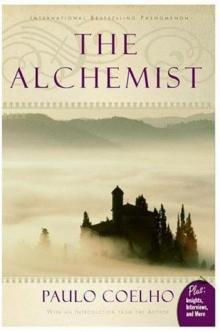 The Alchemist
The Alchemist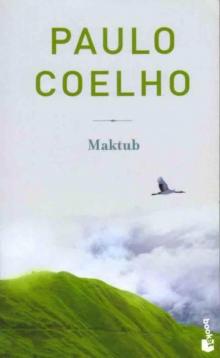 Maktub
Maktub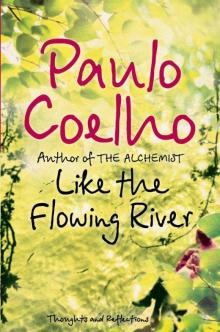 Like the Flowing River
Like the Flowing River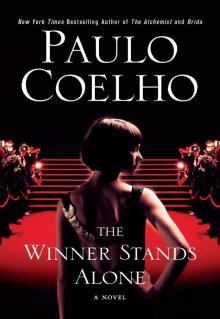 The Winner Stands Alone
The Winner Stands Alone The Spy
The Spy By the River Piedra I Sat Down and Wept: A Novel of Forgiveness
By the River Piedra I Sat Down and Wept: A Novel of Forgiveness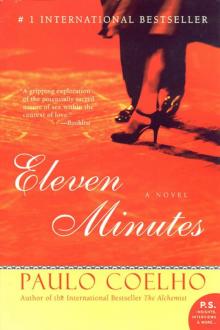 Eleven Minutes
Eleven Minutes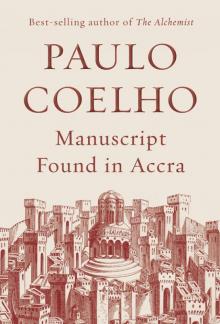 Manuscript Found in Accra
Manuscript Found in Accra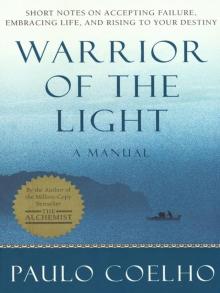 Warrior of the Light
Warrior of the Light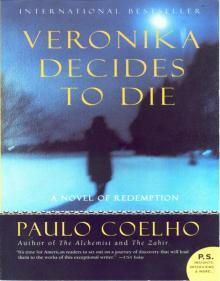 Veronika Decides to Die: A Novel of Redemption
Veronika Decides to Die: A Novel of Redemption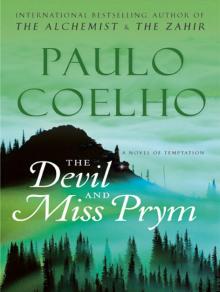 The Devil and Miss Prym: A Novel of Temptation
The Devil and Miss Prym: A Novel of Temptation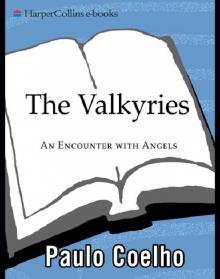 The Valkyries: An Encounter With Angels
The Valkyries: An Encounter With Angels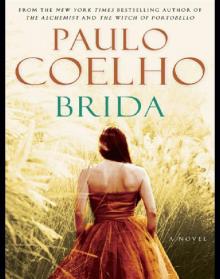 Brida: A Novel
Brida: A Novel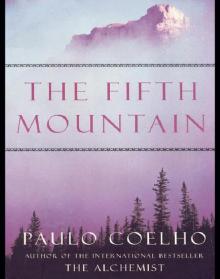 Fifth Mountain: A Novel
Fifth Mountain: A Novel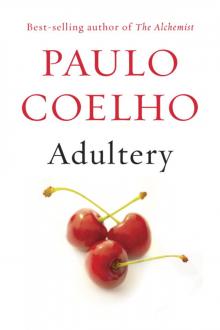 Adultery
Adultery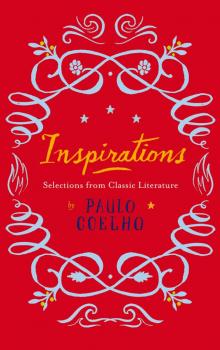 Inspirations
Inspirations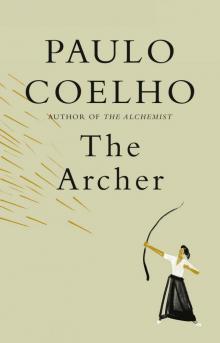 The Archer
The Archer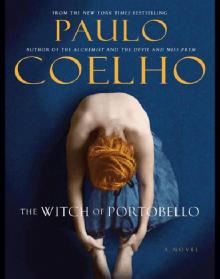 The Witch of Portobello
The Witch of Portobello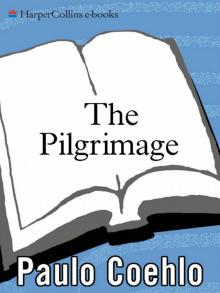 The Pilgrimage
The Pilgrimage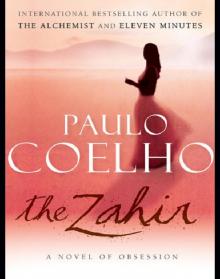 The Zahir
The Zahir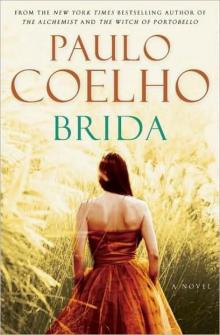 Brida
Brida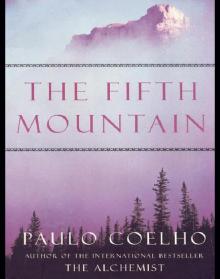 The Fifth Mountain
The Fifth Mountain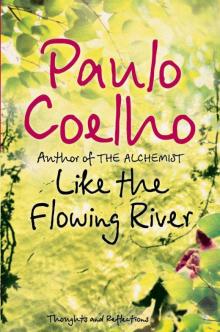 Like the Flowing River: Thoughts and Reflections
Like the Flowing River: Thoughts and Reflections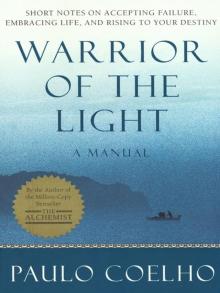 Manual of the Warrior of Light
Manual of the Warrior of Light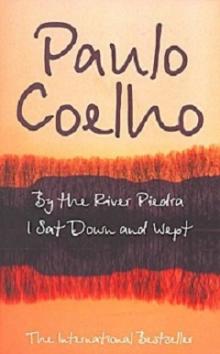 By The River Piedra I Sat Down & Wept
By The River Piedra I Sat Down & Wept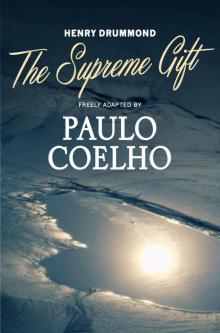 The Supreme Gift
The Supreme Gift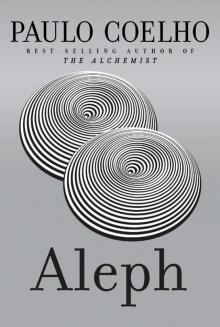 Aleph
Aleph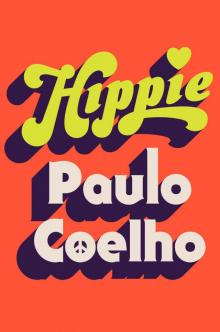 Hippie
Hippie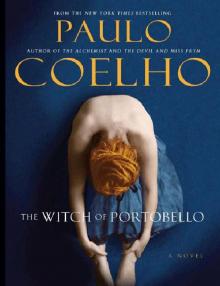 Witch of Portobello
Witch of Portobello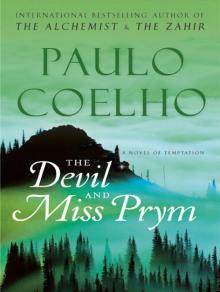 The Devil and Miss Prym
The Devil and Miss Prym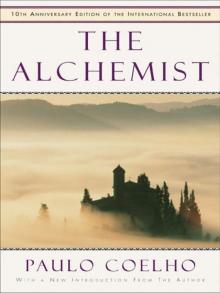 The Alchemist - 10th Anniversary Edition
The Alchemist - 10th Anniversary Edition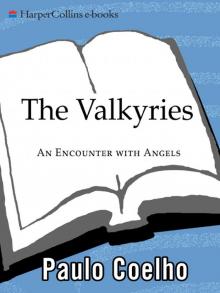 The Valkyries
The Valkyries